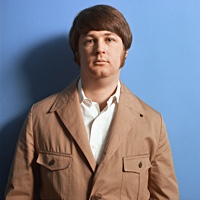Home » Jazz Musicians » Brian Wilson
Brian Wilson
Brain Wilson is one of rock's most deeply revered figures, a legendary writer, producer, arranger and performer of some of the most cherished music in rock history. Indeed, it is no exaggeration to call Brian Wilson one of the most influential pop composers of the last 50 years.
Labor Day weekend, 1961, in Hawthorne, California It was then and there that nineteen-year-old Brian Douglas Wilson and his younger brothers Dennis and Carl assembled in their family's living room with cousin Mike Love and friend Al Jardine to rehearse a little tune that Brian and Mike had written for a try-out recording session.
As luck would have it, the Wilsons' parents were vacationing and had left the boys $250 for food money. Home alone, and promptly using that cash to rent the best musical equipment they could find, the budding Beach Boys got busy.
Written at Dennis' suggestion, "Surfin'" sang the praises of the newest southern California teen craze. Though primitive-sounding by today's standards, the song contained the raw matter that would define the Beach Boys' sound: the propulsive rhythms of Chuck Berry-style rock & roll combined with the sophisticated pop vocals of the Four Freshman.
It was a unique fusion that Wilson had been tinkering with in the family garage where, inspired by The Four Freshman and their complex vocal blends, and armed with a multi-track tape recorder, he'd spent hours exploring the intricacies of harmony and melody. By overlapping his own dynamic voice (which peaked in a soaring falsetto) and various instruments, he could create the effect of a full group.
Completely on his own, and despite near-deafness in one ear, modern audio technology gave Brian Wilson the power to create something beautiful, even magical. When "Surfin"' hit big locally and made ripples on the national charts, the Beach Boys were signed to Capitol Records. The label wanted more of the same, and Brian and the band gave it to them, tapping a potent source of surfing, hot-rod cars and hi-octane hormones at a time when an exploding population of post-World War II teenagers was craving something new.
Releasing hit after hit, the Beach Boys were like an irresistibly refreshing wave that flooded America. And Brian Wilson himself rode that sparkling swell as, beginning with 1962's Surfin' Safari, the early Beach Boys released seven albums (usually titled after their hit singles) in their first two years of existence, including Surfin' U.S.A., Surfer Girl, Little Deuce Coupe, Shut Down, Vol. 2, All Summer Long and Concert.
Read moreTags
Brian Wilson Jazzed: Ten Essential Wilson Covers

by Ian Patterson
Brian Wilson is widely hailed as one of the most significant songwriters of the 20th century--the master craftsman behind The Beach Boys' music. Inspired by rock 'n' roll, doo-wop, George Gershwin, vocal quartet The Four Freshmen and Burt Bacharach, he developed sophisticated harmonies and a signature sound that sold millions of records. His singular use of jazz-inflected harmonies, inventive chords and memorable melodies made his songs ripe for interpretation. His compositions have been covered by hundreds of pop ...
Continue ReadingBrian Wilson and Van Dyke Parks: Orange Crate Art 25th Anniversary Edition (2 CD)

by Doug Collette
Personal estrangement, lawsuits and terminal illness permeated the Beach Boys' world when Orange Crate Art was originally released in 1995. It is thus little wonder it was greeted with more than a little ballyhoo (even if that was bit tentative), but that's also because it was, apart from the single song “Sail On Sailor" from Holland (Brother Records, 1973) the first longplaying-length collaboration between Brian Wilson and Van Dyke Parks since they teamed for the mythic album Smile (formal archiving ...
Continue ReadingBrian Wilson Presents The Christmas Album Live

by Mike Perciaccante
Brian Wilson with Beat Root Revival NYCB Theatre at Westbury Brian Wilson Presents The Christmas Album Live Westbury, NY December 5, 2018 Brian Wilson is many things. As one of the most influential songwriters of all time, a founding member and the musical force behind the Beach Boys, and a Grammy-winning inductee into the Rock and Roll Hall of Fame, his story is well-known. On a cool early December evening, ...
Continue ReadingBrian Wilson at Radio City Music Hall

by Mike Perciaccante
Brian Wilson Radio City Music Hall Pet Sounds 50th Anniversary World Tour: With Al Jardine and Blondie Chaplin New York, NY September 23, 2017 Brian Wilson is a Grammy-winning member of the Rock 'n' Roll Hall of Fame. He is considered to be one of the most influential songwriters of all time. Many see him as a tortured genius. His story is well- known. Wilson is known far and wide as the creative force ...
Continue ReadingBrian Wilson with special guest Rodriguez at the Nikon at Jones Beach Theater

by Mike Perciaccante
Brian Wilson with special guest Rodriguez Nikon at Jones Beach Theater Wantagh, NY June 30, 2015 Brian Wilson and Rodriguez are both survivors. Wilson's story is well-known by almost everyone. Rodriguez' story is slightly more murky. Tortured genius, the primary architect of the California sound and the creative force behind the Beach Boys, Wilson is widely considered to be one of the moist influential songwriters of this or any era. Wilson is the ...
Continue ReadingSMiLE, You're in Rock 'n' Roll Heaven with Brian Wilson

by John Eyles
I don't really know why he came halfway across the world to do it, but he did. Brian Wilson came to London and took over the Royal Festival Hall for a week to give us six live performances of one of the most famous albums never to have been released -the legendary SMiLE -prior to touring with it.Back in 1966/7, SMiLE was to be the follow up to The Beach Boys' classic Pet Sounds album, itself often cited ...
Continue ReadingBrian Wilson & Jeff Beck To Appear At The NYCB Theatre In Westury On October 12, 2013 And At The Beacon Theatre In NYC On October 15, 2013

Source:
Mike Perciaccante
Legendary music icons and Grammy Award winners, Brian Wilson (co-founder Beach Boys) and Jeff Beck (Yardbirds) are co-headlining a North American tour. Two of the music industry's most celebrated entertainers will kick off their tour on September 27th in Hollywood, FL and will visit 20 cities as they bring an evening of historic musical collaboration to fans across North America. Tickets go on sale starting Friday, August 9th at NOON at livenation.com and will also be available at ticketmaster.com. Throughout ...
read more
Interview: Brian Wilson on Smile

Source:
JazzWax by Marc Myers
Last week I traveled to Los Angeles to spend time with Brian Wilson at his home in Beverly Hills. My interview with Brian is in today's Wall Street Journal (pick up a copy or go here if you're a subscriber). As the founding member of the Beach Boys and the musical wizard behind the group's most absorbing recordings, Brian also is probably rock's most direct link to the California's jazz scene of the 1950s. What many jazz fans may not realize ...
read more
Brian Wilson: Canadian Tour

Source:
JamBase
TOUR STARTS JUNE 15 IN KITCHENER, ONTARIO Brian Wilson will embark on his first-ever cross-Canada tour in June of 2011. For many Canadians, the tour represents their first opportunity to directly experience and pay homage to this unrivaled mainstay of the cultural soundtrack. Audiences can look forward to a musical tour de force as Wilson performs his latest critically acclaimed album Brian Wilson Reimagines Gershwin in its entirety, along with a selection of classics from both the Brian Wilson and ...
read more
Brian Wilson: Songwriter 1962-1969 out on DVD 11/23

Source:
JamBase
FEATURES AN IN-DEPTH REVIEW OF WILSON'S SONGS THROUGH THE 60'S The songs Brian Wilson wrote for and recorded with The Beach Boys during the 1960s are re-assessed throughout Brian Wilson: Songwriter 1962-1969 which runs over three hours in length across two discs. The DVD will be released on November 23. There are exclusive contributions from fellow Beach Boys, Bruce Johnston and David Marks; Wrecking Crew musicians Carol Kaye and Hal Blaine; friend and Beach Boys manager Fred Vail; producers Russ ...
read more
Beach Boy Brian Wilson Reimagines Gershwin

Source:
All About Jazz
'Match made in heaven': Brian Wilson and George Gershwin. Brian Wilson says he chose the George Gershwin songs “that I thought I could do justice to."
The album title alone is enough to make pop-music pundits drool, pairing two of the 20th century's most celebrated tunesmiths: Brian Wilson Reimagines Gershwin.
The recording itself, which arrives Aug. 17, was a “labor of love" for Wilson, 68, who was a George Gershwin fan long before he was a Beach Boy or had ...
read more
Brian Wilson to Finish Some George Gershwin Songs

Source:
Michael Ricci
Wilson plans to finish and record at least two songs on an album of Gershwin music that could be released next year.
In a surprise union of two quintessentially American composers from different eras, one the 1960s mastermind of “Good Vibrations," the other the Jazz Age creator of “Rhapsody in Blue," former Beach Boy Brian Wilson has been authorized by the estate of George Gershwin to complete unfinished songs Gershwin left behind when he died in 1937.
He plans to ...
read more
Brian Wilson Feted as Trailblazer

Source:
All About Jazz
ASYM honors music legend Brian Wilson June 10th
The American Society of Young Musicians is set to fete music legend Brian Wilson with its 2009 Trailblazer award at the 17th annual spring benefit concert on June 10 in Hollywood.
The org, which awards scholarships to students of accredited music schools and programs, will induct Wilson into its hall of fame following the awards presentation.
Past attendees of the benefit have included ASYM committee members Quincy Jones, John Mellencamp and Chaka ...
read more
Brian Wilson Charms with Nostalgia at the Grammy Museum

Source:
Michael Ricci
When it comes to living rock 'n' roll legends, few hold as much allure as Brian Wilson. The pop hits, the grand orchestrations, the battles with drugs and mental health issues, the lost albums and the recent career rebirth all make for a compellingly colorful narrative.
None of it was probed too deeply in a Thursday evening discussion and performance at the recently opened Grammy Museum in downtown Los Angeles. But this wasn't a night built to debunk myths. In ...
read more
Brian Wilson Plays the Wiltern

Source:
All About Jazz
Brian Wilson's latest album, That Lucky Old Sun, lives up to his legacy of symphonic and woozy California pop. Catch him and other artists at these upcoming concerts across the Southland, with on-sale dates in parentheses.
The Palladium Taste of Chaos Tour, Thursday, Feb. 14; Disturbed, Jan. 29 (Sat.)
The Wiltern The Pretenders, March 10 (now); Brian Wilson, Jan. 28 (Fri.)
Gibson Amphitheatre Los Fabulosos Cadillacs, April 10 (Fri.)
The Glass House ...
read more
Brian Wilson/ Here Comes the "Sun" Album

Source:
Michael Ricci
Brian Wilson's 'That Lucky Old Sun' album due in September The former Beach Boys mainstay's themed work, snapshots of Southern California life, will be released Sept. 2 and represents his return to Capitol.
Brian Wilson extends his personal and creative renaissance of the last decade with an ambitious new themed album, “That Lucky Old Sun," a work to be released in September exploring the Southern California culture that he helped define musically in the 1960s as the guiding creative force ...
read more
Reviewing the London performance, England's Mojo magazine.
"Brian Wilson is an iconic talent with enormous musical influence all over the world and we are very proud to be representing him."
Guy Hands, executive chairman of Capitol's parent company, EMI Music.















